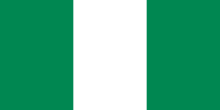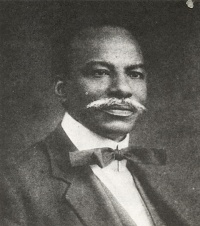


Nigerian nationalism asserts that Nigerians as a nation should promote the cultural unity of Nigerians.[1][2] Nigerian nationalism is territorial nationalism and emphasizes a cultural connection of the people to the land, particularly the Niger and the Benue Rivers.[3] It first emerged in the 1920s under the influence of Herbert Macaulay, who is considered to be the founder of Nigerian nationalism.[4] It was founded because of the belief in the necessity for the people living in the British colony of Nigeria of multiple backgrounds to unite as one people to be able to resist colonialism.[2][5] The people of Nigeria came together as they recognized the discrepancies of British policy. "The problem of ethnic nationalism in Nigeria came with the advent of colonialism. This happened when disparate, autonomous, heterogeneous and sub-national groups were merged to form a nation. Again, the colonialists created structural imbalances within the nation in terms of socio-economic projects, social development and establishment of administrative centres. This imbalance deepened the antipathies between the various ethnic nationalities in Nigeria (Nnoli, 1980; Young, 1993, and Aluko, 1998)."[6] The Nigerian nationalists' goal of achieving an independent sovereign state of Nigeria was achieved in 1960 when Nigeria declared its independence and British colonial rule ended.[1] Nigeria's government has sought to unify the various peoples and regions of Nigeria since the country's independence in 1960.[1]
Nigerian nationalism has been negatively affected by multiple historical episodes of ethnic violence and repression of certain ethnic groups by the Nigerian government between the various peoples has resulted in multiple secessionist movements demanding independence from Nigeria.[1] However aside from instances of extremism, most Nigerians continue to peacefully coexist with each other, and a common Nigerian identity has been fostered amongst the more-educated and affluent Nigerians as well as amongst the many Nigerians who leave small homogeneous ethnic communities to seek economic opportunities in the cities where the population is ethnically mixed.[7] For instance many southerners migrate to the north to trade or work while a number of northerner seasonal workers and small-scale entrepreneurs go to the south.[8]
- ^ a b c d Motyl 2001, pp. 372.
- ^ a b Luke Uka Uche. Mass media, people, and politics in Nigeria. Concept Publishing Company, 1989, pp. 23–24
- ^ Guntram H. Herb, David H. Kaplan. Nations and Nationalism: A Global Historical Overview. Santa Barbara, California, USA: ABC-CLIO, Inc., 2008, p. 1184.
- ^ Uche, Mass media, people, and politics in Nigeria, 1989, p. 23.
- ^ Toyin Falola, Saheed Aderinto. Nigeria, nationalism, and writing history. Rochester, New York, USA: Rochester University Press, 2010, p. 256.
- ^ Aluko, M.A.O (2003). "Ethnic Nationalism and the Nigerian Democratic Experience in the Fourth Republic" (PDF). Anthropologist. 5 (4): 253–259. doi:10.1080/09720073.2003.11890817. S2CID 59246616.
- ^ April A. Gordon. Nigeria's Diverse Peoples: A Reference Sourcebook. Santa Barbara, California, USA: ABC-CLIO, 2003. Pp. 233.
- ^ Toyin Falola. Culture and Customs of Nigeria. Westport, Connecticut, USA: Greenwood Press, 2001, p. 8.
